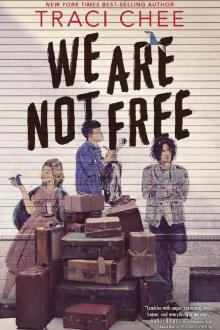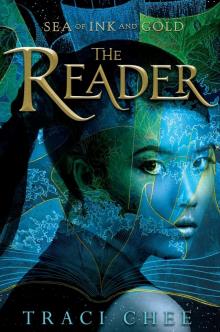- Home
- Traci Chee
The Reader Page 3
The Reader Read online
Page 3
Now it looked as if only a widower lived there.
They kept to themselves as much as possible, gardening, raising chickens and pigs and goats and even some sheep, only going down the slope to the village out of necessity.
Besides the small family, there was only one person allowed in the house, and that person was Nin.
Sefia had guessed a long time ago there was something different about her family—their secrecy, their isolation. Someone was after her parents. She didn’t know why, but she imagined it was some shadowy figure with red eyes and sharp teeth, a monstrous villain come out of her nightmares with metal hounds to hunt them down.
Sometimes she pictured her mother and father as heroes. Keepers of some arcane knowledge. Her mother proud and small, her black hair twisted into a bun at the base of her neck, a silver star glinting at her chest like a sheriff. Her father with a shock of hair like a bristle brush stiff with shoe polish, rolling his large sleeves up to his elbows while the scar at his temple gleamed white.
Sometimes she woke screaming in her basement bedroom, knowing with absolute certainty that someone was coming for them.
“When you teach me, will I be able to pick any lock in the world?” Sefia asked.
“Only if you’re very good.”
“Are you very good?”
Nin didn’t look up. “Don’t be stupid,” she said.
Sefia squinted. Her eyes turned to slits above the soft bump of her nose. “That’s what I thought. Daddy said that’s how he and Mama met you. Because you were the best.”
“Is that what he said.”
“Yep. He said you helped them. He said he wouldn’t be here if not for you.”
“Well . . . I wouldn’t be here if not for them either.”
Sefia nodded. Her parents must have been captured, once, held in iron cages above seething fire pits while their enemies gibbered around them. Nin must have freed them, with her slender tools and miraculous hands, and they’d all gone running into the sunset together.
Smiling, Sefia laid her head on her folded arms, watching silently as Nin’s fingers worked and the little room filled with the clicking and jerking of teeth.
• • •
Under ordinary circumstances, Nin would break for lunch at noon and walk Sefia back up the hill to the house, but on that day there were horses to be shod, axles to be fixed, and all manner of locks and hinges and bolts to be repaired, so Nin sent Sefia scooting out through the back door with warnings to be aware of her surroundings and not to make too much noise.
“And go straight home, or your father will have my head,” she added, giving Sefia one last shove.
Delighted with her temporary independence, Sefia skipped out into the fog. At first she cackled softly and ran at the indistinct shadows of barrels and wheelbarrows, pretending they were monsters rearing out of the mist, but she was too accustomed to caution to dally for long.
As she left the village and began climbing the hill to her house, the fog crept closer. Out of the corner of her eye, she spied swirls of golden light appearing here and there on the dewy slope, but when she looked closer, they melted into wisps of gray. Sefia’s pace grew slower and more subdued. Moisture from the tall grasses clung to her shins and shoes, making her toes uncomfortably damp.
A breeze stirred the mist, and the faint scent of copper stung her nose. Sefia stifled a cough and shivered in the fog. It wound around her like a living thing.
After a moment the smell dissipated—so quickly she wondered if she’d imagined it. But as she inhaled the sweet scent of grass, she tasted metal at the back of her throat and knew it had been real.
In the mist, climbing the hill seemed to take hours, but finally she reached the top, rising out of the fog that lapped at the foundations of the lonely stone house, and stepped up to her front door. Above her, the sky was an empty unnerving blue.
Sefia took out her key—her father always locked the house—but the heavy wooden door on its well-oiled hinges swung silently open at her touch.
They say that fear is a pit in your stomach, but what she felt was a dissolving, as if the fog was burning off and frittering away, leaving behind only Sefia, bare and defenseless with nothing before or behind her but emptiness.
As she tiptoed into the house, even the walls themselves seemed to chip away. One by one went the boards and the beams, falling to pieces with tinny clattering sounds, littering the wooden floors, the broken chairs, the smashed vases and shattered lanterns. It looked as if a hurricane had torn the house apart. Nothing was in its place. Paintings slashed from their frames, her father’s telescope missing from the east window. As she tiptoed through the debris, with every step realizing how silent the house was, how still, it was like the furniture began to crumble, the strands of silk in the rugs fraying and turning to dust, until everything in the house—the copper pots on the floor of the kitchen, the quilt on her parents’ shredded mattress, the overturned dining table—had disintegrated, so by the time she reached the back room, it seemed as if all that remained on the top of the hill were Sefia . . . and her father’s corpse.
She knew it was him without even having to look closely. She could not look closely. She knew it was him by the sheepskin slippers, by the shape of his trousers, by the oversize threadbare sweater. She knew it without having to see his face, because
Her father.
She staggered back, her insides like slush. It was so dizzyingly cold she couldn’t breathe. She gasped, but no sound came out, and no air came in.
Her father.
She stumbled to the fireplace to unlock the secret door. There was a soft click, and a panel of stones slid back into the wall. She entered, pulling the door shut behind her, and descended the steep stairs to her bedroom, which, as her parents had planned, had gone unnoticed and untouched. There were no windows in the basement, so she groped her way among the chairs and toys that had once seemed so familiar—now riddled with the potential for bruised toes and dinged shins.
But she had been preparing for an event like this—just like this—for years. When her mother was still alive, they had rehearsed the steps together; and when her mother died, her father had made her practice, and practice, and practice. Some days, Sefia ran through the steps so often that she dreamed of them when she slept. She had been drilled so many times that, as she was meant to, she had begun to implement the steps already.
Blindly, she fumbled for the knob of her bedpost and began to unscrew it from its wooden leg. Inside was a key—a shiny silver thing shaped like a flower, something that might be overlooked, mistaken for a child’s plaything—that unlocked the second secret door in the north wall.
Sefia opened it and crawled inside, closing the door behind her, shutting herself into a room barely bigger than a travel trunk. And then she cried. She cried until her head ached and bright spots burst across her eyes. She cried loudly, hoping someone would hear, and quietly, fearing the same thing. She cried until she had almost forgotten about the mutilated body sprawled on the floor above her. And she cried again when she remembered.
Eventually she must have blacked out, because she awoke what seemed like hours later, with her eyes swollen nearly shut and her nose stuffy with snot. Gulping back a few dry sobs, Sefia uncurled, aching, from the floor and put her palms to the stone walls.
There was no key to the third door. Nin had designed it to open when the cobblestones in the wall were pressed in a certain order, and though Sefia’s parents had rehearsed the series with her, they had always done it in the warm lamplight of her bedroom. Get to the tiny room, then wait for her parents to arrive. That had always been the plan. They had always known someone would hunt them down, eventually, but they had always thought one of them would survive.
Sefia remembered the sequence; her hands found the right river rocks by their contours—the first one in the upper left-hand corner, the second
shaped like an owl, the third like a cabin, then a half-moon, two mice in a row, and the last a shaggy buffalo with a single stubby horn. As she touched them, they clicked into place. But what happened next was something her parents had never mentioned, had not warned her about or prepared her for, and it was perhaps the most important thing of all.
As the small door unlatched, something—some heavy rectangular thing wrapped in soft leather—fell out of the crack in the door. It must have been wedged there, stuck fast in the threshold.
Sefia ran her fingers over it and clasped it to her chest. She hadn’t seen it once in all the years she’d been practicing for her escape.
She considered leaving it. The thing was so heavy and awkward in her skinny arms. She wished she’d thought to take something from the house before she left. Her mother’s silver ring with the secret compartment inside, a painted hand mirror, one of her father’s old sweaters—anything would have done. But they’d never taught her that. They never told her she might want a keepsake, a memento. And now all she had was this thing.
She gripped it tighter, until its edges dug into her palms and the flesh of her cheek, and then she took it with her.
She had to go on her hands and knees. The tunnel was a burrow of crumbling dirt walls, with some places so narrow she couldn’t even crawl—she had to lie on her belly and worm, pulling herself along with her fingers, pushing with her elbows, the tips of her toes. She slithered for hundreds of feet in the unimaginable dark, an almost tangible darkness, blacker than night, blacker than closets with closed doors, blacker than closed eyes under bedsheets.
As she inched forward, not knowing how far she had come or how far she had to go, with nothing but the noise of her own body and the darkness, it was the very thingness of the rectangular thing, pushed before her as she slid through the tunnel, that assured her she was still alive, that she had not perished in the aboveground world with her father.
At last she reached the end, where the tunnel terminated abruptly in a wooden hatch. Sefia crouched beneath it, scuffling at the splintered ceiling, and unlocked the door. Pushing upward with what remained of her quavering strength, she heaved it open and emerged in a tangle of bramble with summer’s last shriveled berries still clinging to the vines. She pulled herself through the hatch, clutching the rectangular thing to her side.
It was evening. The fog had burned off, and the cool air was clear, the shadows bruised and purple. She rubbed her arms. The entire afternoon had passed, sucked up by the darkness of the tunnel. For a moment, Sefia crouched, scratched and dirty, in the deep knotted safety of the thicket.
Her parents had given her three instructions: Use the secret doors. Go through the tunnel. Find Nin. She’d done the first two, and after she did the last, she’d have nothing left of them. Nothing but the strange object in her arms.
Sefia shut the hatch as quietly as she could and stood up. She recognized this thicket. Her father used to take her berrypicking here, and when their baskets were filled, they’d bring one to Nin. He’d always claimed these brambles had the sweetest fruit, but now she realized he’d been training her, showing her the way.
At the thought of her father, she began to cry again. Clutching the leather-wrapped object as if it were a blanket or a stuffed toy or a shield, Sefia stumbled out of the bushes and took off running through the dusk, ducking branches as they snatched at her hair. Saplings slapped at her face and arms. Ditches fell out from underneath her. But even though she sobbed and stumbled, even though her legs were weak and her body was shaking, she didn’t stop.
By the time she got to Nin’s back door, Sefia was lost and half-gone with grief, spitting, blind, blundering, falling into Nin’s thick cushiony arms as if she were diving off a cliff.
Dimly, she heard Nin’s voice: “It’s finally happened, hasn’t it? I’m sorry, girl, I should’ve been there. I should’ve walked you home.”
She had done what she’d been told. Use the secret doors. Go through the tunnel. Find Nin. And now it wasn’t her father’s empty dismantled body that frightened her so much, but the silence, that unbreakable silence of the dead, because there would never be another reassuring word, no familiar gurgle from laying her cheek on her father’s stomach, no sneezes, no coughs, no creak of tired joints, none of those everyday sounds of life. She had done what she had been told. And now there would be no further instructions, no way for another word to pass from her father’s lips into the bright prism of the still-living world. He was dead. And gone forever.
Chapter 4
This Is a Book
The rain had not let up by the time Sefia awoke the next morning, and the little tent was filled with cold dingy light. As she lay there staring up at the stained canvas, she could have sworn she saw movement out of the corner of her eye: Nin stirring beneath the mound of clothing. Or there, Nin passing outside the tent. But it was just the water dripping out of her belongings, it was just a shadow falling across the canvas. Nin was gone. She had been cut out of the world like a paper doll, though Sefia could still see where she should have been, the vague outlines of her silhouette, the spaces echoing with the things she should have said.
Wincing at the pain in her ankle, Sefia sat up and stared at the unmoving tent flaps as the memories of the previous day washed over her again. The stench of metal. The pockmarked face of the woman in black. The crack of Nin’s bones.
Nin had protected her to the last, and Sefia had done nothing to save her.
Twisting her damp hair away from her face, Sefia began digging her belongings out of the pack, laying them out in neat piles until her searching hands hit something flat and solid and firm.
This.
This was what they wanted.
She had kept it for six years, and though she remembered it often, she’d only taken it out once.
She’d been nine, and she and Nin had left the house on the hill two days earlier. Nin was off hunting, and Sefia had pulled it out of her pack. A heavy thing like a box, with dark damaged spaces along the edges that must have been for filigree and jeweled settings, though someone had torn most of that off a long time ago. The only gold pieces left on it were the caps on the corners and two tarnished clasps that kept it closed. She’d been on the verge of opening it when Nin came back.
“What are you doing?” Nin demanded. A dead rabbit dangled from her hand.
Sefia froze and looked up at her guiltily. “What is this?”
Nin stared at the thing like it was a bear trap, full of metal teeth. “I never asked,” she snapped. “Put it away. I don’t want anything to do with it.”
“But Aunt Nin, it belonged to—”
“I’m not your parents.” Turning her back, she began to skin the rabbit. Among the sounds of ripping flesh and popping sinew, her next words came over her shoulder, cold and final: “If I see it again, I’ll throw it in the fire with the logs.”
Sefia hadn’t looked at it since then, but whenever she cleared out her pack, she touched it. Her hands knew the shape of the thing so well she could have recognized it in the dark.
The memories lanced through her chest again.
Her father.
Her aunt.
Sefia dug her fingers into the leather casing and ripped it away. Through bleary, angry tears, she stared down at the rectangular object in her lap.
The rich brown leather seemed to glow like varnished wood, and in the center was some sort of emblem, like the crests she’d seen over the shops in town, a circle inscribed with four lines:
The leather had been stamped and burned, so the lines were dark and sharp. A clue. As she studied the symbol, she tried to imagine what it was supposed to be.
A trident.
A rising sun.
A helmet.
Tipping the strange box on its side, she studied the gold clasps that held it closed. Whatever was inside must have been important. And dangerous.
Her mind flicked through the most dangerous objects she knew: guns, knives, poisons, magical items like the Thunder Gong or the Long Telescope that could see through walls, cursed objects like the Executioner or the Diamonds of Lady Delune.
Or maybe it would tell her where to find them—the people who had taken Nin. And if she could rescue Nin, if she could get to her in time, maybe that would make up for letting them take her in the first place.
She hoped.
Sefia flicked open the clasps and raised the lid.
Inside was paper. Just paper, smooth and crisp as ice. She riffled through it, turning each sheet first one way, then another, expecting illustrations, but all she saw were patterns, line after line like ribbons of black lace.
Is this it?
Panicked, she dug through the paper, searching for clues, tearing faster and faster through the sheets until paper cuts crossed her fingertips and whorls of blood smeared the corners. Until at last she realized that no matter how far she flipped, she never reached the beginning or the end. There was always more beneath her frantic fingers.
She slammed the box shut and thrust it away. Her hands stung.
Paper. That’s all they’d wanted. An infinite supply of paper, to be sure, but nothing more than paper, strewn with marks like debris from an explosion.
Tentatively, she lifted the lid again. With the tip of her finger she traced the strange markings: straight lines like beetle tracks through a dead log, or birds swarming in a white sky. Each tiny sign was perfectly formed, with little flags and short tails at the ends of each stroke, resting on invisible horizontal strings like pins perched on a clothesline. But they weren’t guild signs or crests, and they didn’t make pictures, like tiles in a mosaic.
They did repeat. She spotted individual marks recurring again and again on a single page, and found entire clusters replicated, sometimes ten or thirty times in perfect patterns.

 We Are Not Free
We Are Not Free The Reader
The Reader The Storyteller
The Storyteller The Speaker
The Speaker